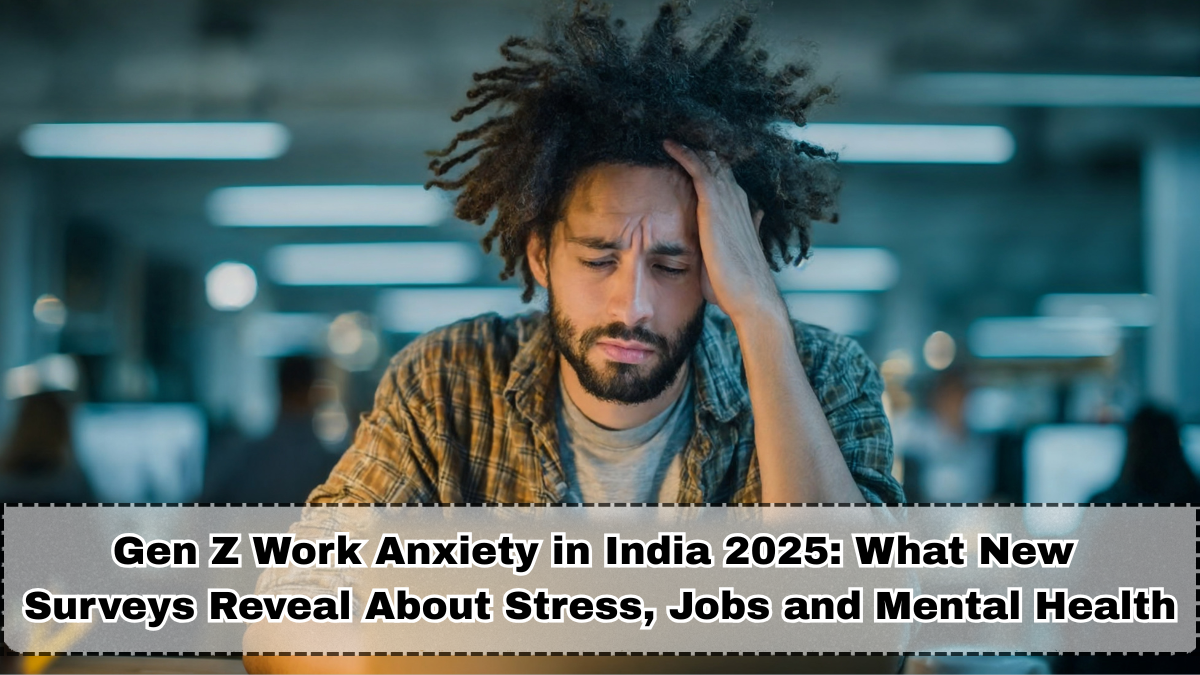As workplaces become faster, more digital and more demanding, Gen Z work anxiety India 2025 has emerged as one of the biggest mental-health concerns in corporate India. New work stress surveys show a worrying reality: young Indian employees—those between 18 and 27—are silently battling high pressure, performance anxiety, boundary-less work hours and the constant expectation to be available online. While older generations could switch off after office hours, Gen Z struggles with Slack pings, WhatsApp deadlines, late-night emails and hybrid work routines that blur the line between work and personal life. This silent crisis is reshaping how India’s youngest workforce thinks about jobs, ambition and mental well-being.
The modern Indian workplace has become a psychological minefield for Gen Z. They are entering careers during economic uncertainty, frequent layoffs, rising competition, and social media comparisons that intensify self-doubt. Most Gen Z employees report feeling judged not just on their work output but also on how fast they reply, how visible they are online, and how many extra hours they’re willing to contribute. The expectation to be “always switched on” is driving a new generation toward chronic stress and early burnout. According to work stress survey India reports, over 70% of Gen Z employees feel anxious before Monday mornings, and nearly half experience physical symptoms such as fatigue, headaches or sleep disruptions linked to job pressure.

Why Gen Z Is More Vulnerable to Work Anxiety Than Older Generations
Unlike millennials or Gen X, Gen Z began their careers in a post-pandemic world where hybrid work and remote collaboration became the norm. This created a culture where meetings, deliverables and team communication take place across emails, chats and video calls—often during late evenings. Social media also intensifies insecurity because Gen Z constantly sees curated success stories and comparisons from peers, adding pressure to perform flawlessly. The result? Their self-worth becomes tied to productivity and validation from bosses or colleagues.
Many young Indians also struggle with financial anxieties—student loans, high rent, unstable job markets and rising living costs. These pressures combine with Gen Z mental health struggles like overthinking, imposter syndrome and the fear of disappointing family expectations. The psychological load becomes heavier when the support systems at work are weak, leaving Gen Z feeling isolated, overwhelmed and underprepared.
Hybrid Work: A Boon or Hidden Burnout Trigger?
Hybrid work India is meant to create balance, but surveys show mixed results for Gen Z. While it reduces commute stress, it also removes clear boundaries. Working from home means staying connected to devices for 12–14 hours, receiving messages at odd hours and juggling personal responsibilities alongside meetings. Many Gen Z employees report feeling guilty about taking breaks because working from home creates a constant “pressure to prove productivity.”
This environment makes it harder to mentally switch off. With no clear end to the workday, many young employees experience blurred identities—feeling neither fully at work nor fully at rest. HR experts warn that hybrid patterns combined with office burnout indicators—fatigue, irritability, emotional numbness, low motivation—are becoming increasingly common among India’s youngest workforce.
Signs Gen Z in India Is Quietly Struggling at Work
The Gen Z work anxiety India 2025 reports highlight several warning signs that often go unnoticed but reveal deep psychological strain:
• Overthinking every email or message
• Fear of making small mistakes
• Feeling “replaceable” in their team
• Avoiding calls or meetings out of anxiety
• Constantly checking phone notifications
• Feeling exhausted even after weekends
• Emotional outbursts or sudden mood swings
• Difficulty concentrating during meetings
• Having trouble sleeping due to work thoughts
These subtle signals suggest that work anxiety isn’t just a temporary phase—it’s becoming a chronic issue affecting productivity and mental health.
What Gen Z Wants From Indian Workplaces in 2025
Young employees are not asking for luxury perks—they want mental safety, clear communication and humane expectations. Surveys show four major demands:
1. Respect for boundaries:
No late-night messages, no unrealistic deadlines and no guilt-tripping over mental breaks.
2. Supportive managers:
Leadership that prioritises clarity, empathy and constructive feedback instead of micromanagement.
3. Mental health resources:
Counselling access, burnout prevention workshops and psychologically safe team environments.
4. Growth opportunities:
Skill-building, fair appraisals and career pathways that help Gen Z feel valued.
Companies that implement these changes are reporting lower attrition rates and higher productivity—proving that prioritising mental health is not just ethical but also strategic.
How Gen Z Can Protect Their Mental Health in 2025
While workplaces need reform, young employees can also practice self-protection. Experts recommend the following realistic strategies:
• Create digital boundaries—no notifications after a fixed hour
• Use the “20-5 rule” (20 minutes work, 5 minutes reset)
• Share workload concerns early instead of silently suffering
• Build offline hobbies that reduce overthinking
• Keep weekends free from office tasks
• Schedule mini mental breaks during the workday
• Avoid doomscrolling before bed
• Practice movement—walking, stretching or gym sessions to reduce cortisol
These steps help reduce anxiety, recharge the mind and build resilience against burnout.
Why Gen Z’s Anxiety Matters for India’s Future Workforce
Gen Z is set to become India’s largest working demographic in this decade. If their mental health is compromised early, the impact will be long-term—affecting productivity, creativity, innovation and workplace culture. Companies that want to stay competitive must prioritise reducing work stress survey India red flags and build emotionally intelligent work environments.
2025 marks a turning point: India can either continue the toxic hustle cycle or build a new work culture that balances ambition with emotional well-being.
FAQs
What is causing high Gen Z work anxiety in India?
A mix of hybrid work pressures, constant digital availability, financial stress, performance pressure and lack of boundaries.
Are Gen Z employees more sensitive than older generations?
Not sensitive—just more aware. They openly acknowledge stress instead of hiding it, which helps push for healthier work cultures.
Can hybrid work reduce burnout?
Only if boundaries are maintained. Without limits, hybrid work can increase stress instead of reducing it.
What do surveys say about Gen Z mental health in offices?
Most surveys show rising anxiety, early burnout symptoms and a strong preference for supportive managers and mental-health-friendly environments.
How can workplaces support Gen Z employees better?
By setting clear expectations, avoiding after-hours messages, offering mental health support and promoting healthy work-life balance.
Click here to know more.
